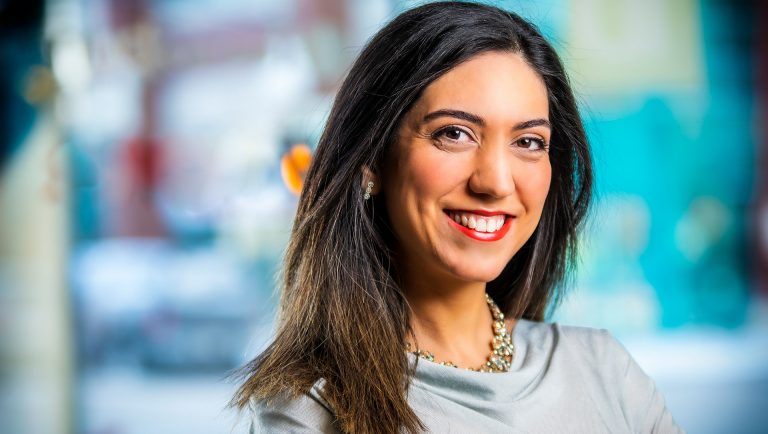Concordia Public Scholar Ezgi Ozyonum wants to decolonize our curricula

How can we promote authentic, ethical, and respectful teaching, research and community engagement? Whose voices and perspectives are missing in our course materials? Who is at the centre? Who remains outside, at the margins?
These are just some of the questions that Concordia Public Scholar Ezgi Ozyonum is trying to answer.
The work of the PhD candidate in education focuses on addressing the colonial legacies in education and integrating marginalized knowledge systems into our curriculum and pedagogy.
“Colonial structures are embedded within universities and they privilege Eurocentric knowledge, standards and norms,” she says. “My research explores how to decolonize education in academia.”
Originally from Turkey and educated in the Middle East, Ozyonum has presented her research at academic conferences around the world, including those hosted by the Comparative and International Education Society and the American Educational Research Association. She is an active member of the Decolonial Perspectives and Practices Hub.
‘Colonization includes control of knowledge production’
For those who might not be familiar with it, can you explain what’s behind the concept of decolonization?
Ezgi Ozyonum: Decolonization is a process to challenge colonial engagements by going beyond cultural awareness and inclusion. It involves disrupting systemic oppression, decentring dominant paradigms and pluralizing voices of those who have been traditionally marginalized.
Colonization is not a past event. Colonization is more than conquering and establishing colonies — it is a system of domination that includes the control of the knowledge production.
How do we decolonize a university curriculum?
EO: Decolonization starts with you. Getting involved in the discourses of the decolonization of curriculum and joining workshops on deconstructing syllabi are essential. We can ask the following questions: Does our course design provide opportunities to share and create knowledge collaboratively? In what ways are Indigenous and other marginalized knowledge systems integrated into our course materials?
Would you say that it’s ever possible for institutions and cultures to totally rid themselves of basic biases regarding ‘the Other’?
EO: Yes, but it will not be very soon. It requires a lifetime commitment to eliminate biases.
We need to decolonize and not further perpetuate colonial, sexist and racist engagement. We should transform the structures and deepen our understanding of what genuine inclusivity and diversity look and feel like.
According to Indigenous scholar Linda Tuhiwai Smith, Indigenous peoples’ experience was dismissed and they weren’t considered fully human. It was claimed that they did not invent things, create institutions or produce anything of value. People were blind to non-Western ways of knowing.
We are now recognizing the plurality of knowledges within our curriculum and pedagogy and this will help institutions and cultures to rid themselves of basic biases regarding themselves and the other.
Is your work essentially advocating for greater self-consciousness on behalf of the ‘Western world’ and its institutions, relating to how it has interacted with other regions historically?
I am advocating for social and cognitive justice — there is no social justice without having cognitive justice.
What I mean is, the cognitive injustice exists at the core of the knowledge production since the beginning of the modern colonization of the world. My research promotes justice against epistemicide (genocide of epistemologies). The struggle for social justice includes the quest for cognitive (epistemic) justice.
Indigenous scholar Marie Battiste has a concept of “culturalism” that helps us to understand how dominant culture has become universal and is seen as a neutral standpoint academically and pedagogically.
Canadian higher education institutions are launching their strategies for decolonization to transform the education. I am hopeful that this will allow silenced perspectives to flourish within academia.
You’ve studied both in Turkey and the ‘Western world.’ What, in your opinion, are some of the blind spots in Canada, Europe and the United States about ourselves in relation to other cultures and regions?
I believe each culture and nation has something to contribute to the betterment of the world. If we keep our perspectives narrow and limit knowledge to one part of the world, then humanity will miss many opportunities to advance. The rest of the world is also producing knowledge but it is not acknowledged or valued.
The Western way of knowing is valuable and needed, but we should acknowledge that there are also other ways of knowing. As educators, our role is to construct a system of knowledge integration where there is no domination over the other. Because of the power dynamics in the colonial knowledge production, many people and educational institutions have suffered.
Join Ezgi Ozyonum for her virtual demonstration of live and interactive syllabus deconstruction Decolonial Perspectives and Practices Hub on November 8 from 12 to 2 p.m.
Sit in on Ezgi Ozyonum's discussion with Concordia's director of decolonizing curriculum and pedagogy on November 10 from 1 to 2 p.m.
Find out more about Concordia’s Department of Education and the 2021-22 Public Scholars.


